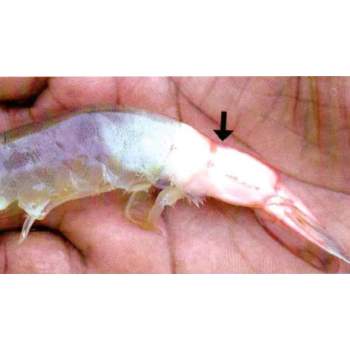
Infectious Myonecrosis Virus (IMNV) is an emerging shrimp RNA virus causing the disease, infectious myonecrosis (IMN). The disease was first recorded in Pacific white shrimp, P. vannamei in Brazil in 2002 and then in 2006 in Indonesia including Java island. The disease causes significant economic losses to aquaculture due to associated mortalities in P. vannamei in grow out ponds. The virus infects all the life stages of shrimp including post larvae, juveniles, and adult, but the mortality was observed in the juveniles and adult with a cooked appearance.
Causes
IMN is caused by a putative totivirus. IMNV particles are icosahedral in shape and 40 nm in diameter. Transmission via water and vertical transmission from broodstock (trans-ovarian or by contamination of the spawn eggs) to progeny is also likely to occur. IMNV may also be transmitted among farms by feces of seabirds or shrimp carcasses. Outbreaks of IMN with sudden high mortalities may follow stressful events such as capture by cast-net, feeding, sudden changes in salinity or temperature, etc., in early juvenile, juvenile, or adult P. vannamei in regions where IMNV is enzootic.
Symptoms
IMN disease causes significant mortality in grow out ponds and is characterised by acute onset of gross signs including focal to extensive whitish necrotic areas in the striated muscle, especially of the distal abdominal segments and the tail fan, which may become necrotic and reddened similar to the colour of cooked shrimp.
Juveniles and sub-adults of P. vannamei, farmed in marine or low salinity brackish water, appear to be the most severely affected by IMN disease. The principal target tissues for IMNV include the striated muscles, connective tissues, haemocytes and the lymphoid organ parenchymal cells. Severely affected shrimp become moribund and mortalities can be instantaneously high and continue for several days. Mortalities from IMN range from 40 to 70% in cultivated P. vannamei, and FCR of infected populations increase from normal values of ~ 1.5 to 4.0 or higher.
Prevention
No effective vaccines for IMNV are available. IMN can be prevented using SPF broodstock and practicing BMPs.